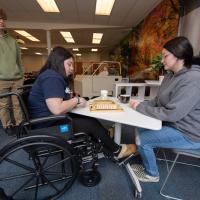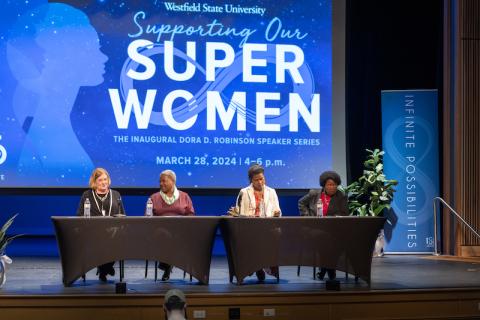
Westfield State University Hosts Inaugural Dora D. Robinson Speaker Series Symposium

Cheryl Woods Giscombe, Phyllis Sharps, Elizabeth Dineen, and Kimberly Williams during Supporting Our Superwomen symposium on March 28.
Recognizing the legacy of Dora D. Robinson, an influential advocate for social and racial justice, Westfield State University hosted its inaugural event “Supporting Our Superwomen – The Dora Robinson Speaker Series,” on March 28 at Dever Stage in Parenzo Hall. The event was a celebration of women’s achievements and a platform to address the challenges faced in contemporary society.
The symposium featured speakers Cheryl Woods Giscombe, PhD, RN, PMHNP, FAAN, FABMR, and Phyllis Sharps, PhD, RN, both known for their advocacy for equity and recognition of women in public service roles. Cheryl Woods Giscombe, a professor and Interim Senior Associate Dean at The University of North Carolina at Chapel Hill, and Phyllis Sharps, the Associate Dean of Community Programs at Johns Hopkins University School of Nursing, brought their expertise to the discussion on the "Superwomen Syndrome," shedding light on the pressures that lead women to prioritize perfection over their well-being.
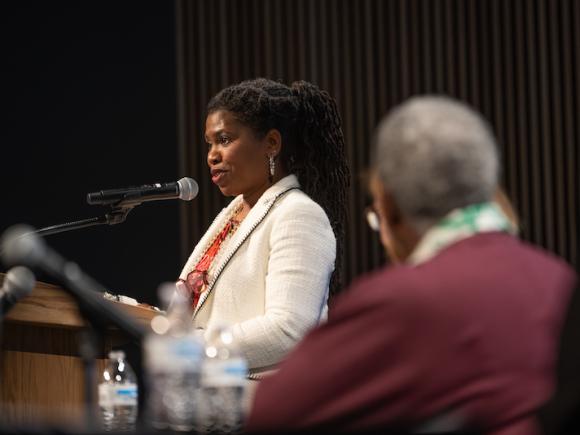
Elizabeth Dineen and Kimberly Williams also participated in the symposium. Dineen has worked 27 years as an Assistant District Attorney in Hampden County, specializing in prosecuting cases of domestic violence, child abuse, and sexual assault. Her dedication to advocating for victims and promoting justice has earned her widespread recognition and respect in the legal community.
Meanwhile, Kimberly Williams, a leader in the field of diversity, equity, and inclusion, for the Center for Human Development, is actively involved in nonprofit organizations such as The Greater Springfield (MA) Links Inc. and Martin Luther King, Jr. Family Services, where her contributions has had a lasting impact on fostering inclusive communities.
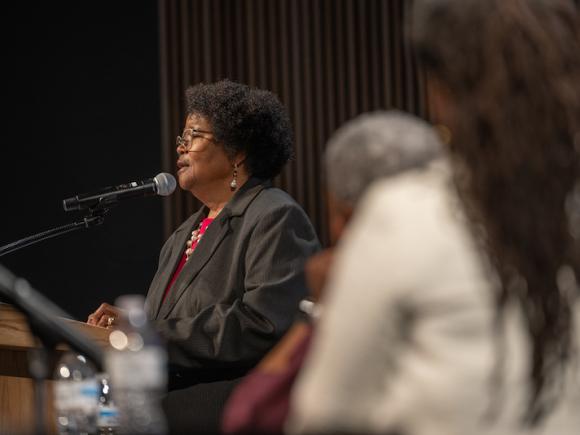
“Dora Robinson was an inspiration to so many as she carried out social and racial justice activism throughout her life,” Dr. Linda Thompson, president of Westfield State, said at the symposium. “Dora never met a stranger. Those she leaves behind will deeply miss her unwavering commitment to serve; her ability to create something grand out of nothing; her bright smile and her infectious laugh. The legacy and impact of her time on this earth and in this community will never be forgotten. For all these reasons, and so many more, we honor Dora in the naming of this annual speaker series.”
Elizabeth Dineen recounted her personal experiences with Dora, describing her as “caring.” “One of the legacies Dora left is the legacy of women helping other women,” she said. “ She walked the walk every day of her life. To be here today to talk about health and what it’s like to be a superwoman is an honor. I wish she were here with us today because every time I had the opportunity to be with her, I learned something. She truly wanted every woman to succeed.”
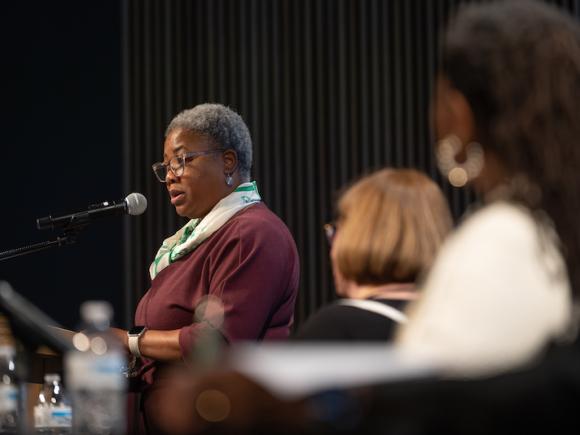
Following Dineen, Kimberly Williams, Robinson’s daughter, read a poem by Langston Hughes, before speaking on her mother’s bright and warm character. “I know her spirit is in this room with us today,” Williams said. “She was a blessing, and a natural leader. She was loyal, gracious, hard-working, and a little bossy. She had a way of making everybody feel like they were the center of their universe. She would encourage anyone to keep pressing on, and she took her social work very seriously. She was always climbing, and not just for herself, but so that she could reach back and elevate others.”
“I’ve been carrying Dora’s voice with me, even in my heart,” Cheryl Woods Giscombe said in her remarks. “It’s such an honor to speak at this event. I want to elevate the legacy of such a trailblazer, a mother, a friend, and her amazing commitment to her work.” Giscombe then discussed Superwoman Syndrome, a phenomenon predicated by women seeking perfection even at their expense due to gender-based disparities in the workplace.
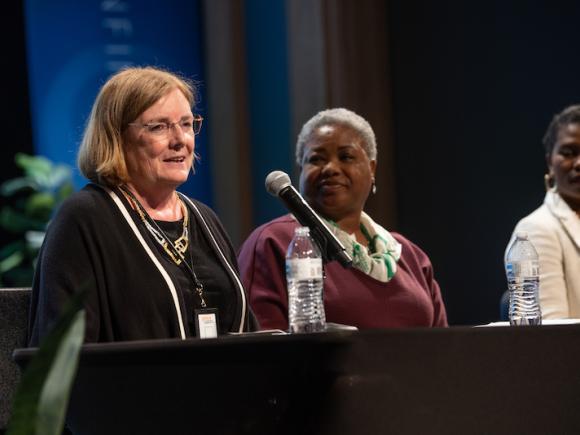
Phyllis Sharps followed Giscombe’s address. “From the beginning of time, there have been superwomen who have met challenges and moved mountains. Thanks to the work of Dr. Giscombe and others, we’re learning about things we need to be mindful of.” Sharps also discussed her own work advocating for women and children, as well as the various racial biases African American women face across the nation both in healthcare and the workforce.
Following the symposium, a reception was held at the Scanlon Banquet Hall, offering attendees an opportunity to network, exchange ideas, and deepen their understanding of the topics discussed during the event. The inaugural "Supporting Our Superwomen - The Dora Robinson Speaker Series" symposium not only celebrated women's achievements but also sparked meaningful conversations about the ongoing journey towards gender equity and inclusivity in our communities.
